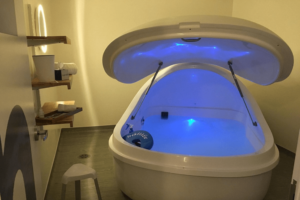Athletes put their bodies through intense training to reach their goals. While this effort builds strength and skill, it often brings soreness, fatigue, and stress that can slow down progress. More athletes are now turning to float tank therapy benefits to recover faster, improve focus, and take better care of their overall health. This unique practice, also called sensory deprivation, provides both physical and mental relief that supports sports performance in many ways.
In this article, we will look at the effects of float therapy, the health benefits of float therapy, and how it helps athletes recover faster.
Understanding Float Therapy for Athletes
Float therapy takes place in a special tank filled with warm water mixed with a large amount of Epsom salt. The salt makes the body float with ease, creating a feeling of complete weightlessness. The tank is quiet and dark, blocking outside distractions and allowing the body and mind to fully relax.
For athletes, this experience does much more than provide rest. The mix of reduced pressure on the body, magnesium from the salts, and deep relaxation creates the perfect environment for quicker recovery and a stronger mental reset.
Reducing Muscle Soreness with Float Therapy
Hard workouts often leave athletes with muscle soreness caused by small tears in the muscle fibers. One of the biggest float tank therapy benefits is that it helps reduce this soreness by improving blood circulation and allowing the skin to absorb magnesium. Magnesium plays an important role in easing cramps, relaxing muscles, and speeding up the repair process.
Spending an hour in a float tank helps the body relax and can bring less stiffness, less inflammation, and better flexibility. This means athletes can get back to their training routines with less pain and less downtime.
Speeding Up Recovery After Training
Recovery is just as important as training itself. Without proper recovery, athletes risk injuries and slower progress. A key effect of float therapy is that it helps reduce the build-up of lactic acid, which is often the cause of tightness and fatigue after workouts.
When the body floats weightlessly, pressure is removed from joints and muscles. This gives the body the chance to recover naturally in a soothing environment. Many athletes notice that after a float session, they wake up refreshed, energized, and ready for the next challenge.
Float Therapy and Mental Focus
Sports performance depends not only on physical strength but also on mental clarity. Competitions and intense training can create high levels of stress and mental fatigue. During a float therapy session, the mind experiences calmness with no distractions. This allows athletes to clear their thoughts, focus on visualization, and prepare mentally for competition.
The health benefits of float therapy also extend to improved concentration, which helps athletes react faster, make sharper decisions, and perform better under pressure.
Improving Sleep Quality Through Float Therapy
Sleep plays a big role in recovery, but athletes often struggle to get quality rest due to stress, training schedules, or muscle discomfort. One of the most valued float tank therapy benefits is better sleep. The deep relaxation athletes experience while floating helps reset their sleep cycle.
After floating, many athletes find it easier to fall asleep and enjoy more restful nights. Better sleep supports muscle repair, energy levels, and overall performance.
Supporting Injury Recovery
Injuries are a common part of sports life. While medical care is essential for healing, float therapy can play an important supportive role. The weightless environment eases pressure on injured areas and allows the body to rest without strain.
Athletes recovering from sprains, joint issues, or tendon pain often find that floating helps reduce discomfort and supports the healing process.
Boosting Athletic Performance with Float Therapy
Recovery is only one part of the benefits. Float therapy can also improve performance. By lowering stress hormones such as cortisol and increasing the release of endorphins, athletes feel more motivated and focused.
Some of the health benefits of float therapy that directly support performance include clearer thinking, faster reaction times, improved mood, and stronger motivation to train. This balance of body and mind gives athletes an advantage in competition.
Why Athletes Are Turning to Float Therapy
Athletes across the United States are starting to make float therapy part of their regular routines. From runners and swimmers to football players and weightlifters, many are experiencing firsthand the float tank therapy benefits for both recovery and long-term health.
The practice is becoming more popular because it is simple, drug-free, and effective in supporting both physical and mental performance.
Conclusion: Secret Soak Society for Float Therapy Guidance
For athletes looking to recover faster, think more clearly, and perform at their best, float therapy is a smart and proven choice. The effects of float therapy give athletes the recovery support they need while also improving mental focus and sleep quality.
If you are ready to explore this practice, Secret Soak Society offers expert guidance and support. They are known for helping athletes experience the full health benefits of float therapy, making them a trusted partner for recovery and performance improvement.
FAQs on Float Therapy for Athletes
Q1: How often should athletes use float therapy for recovery?
Many athletes find that one or two sessions per week provide the best results, especially during periods of heavy training.
Q2: Does float therapy help with stress before competitions?
Yes, the calm environment lowers stress and helps athletes prepare with a clear mind.
Q3: Can float therapy replace physical therapy after injuries?
No, it should not replace medical care, but it works well as extra support for pain relief and recovery.
Q4: Are there any side effects of float therapy for athletes?
Float therapy is safe for most people. Some may need a short time to adjust to the new experience, but discomfort is rare.
Q5: How long does a float therapy session usually last?
Sessions generally last between 60 and 90 minutes, depending on what the athlete prefers.
Q6: Does float therapy improve sleep for athletes?
Yes, many athletes report falling asleep faster and enjoying deeper rest after float sessions.
Q7: Why should athletes choose Secret Soak Society for float therapy guidance?
They provide trusted float guidance that helps athletes make the most of the effects of float therapy for recovery and performance.





